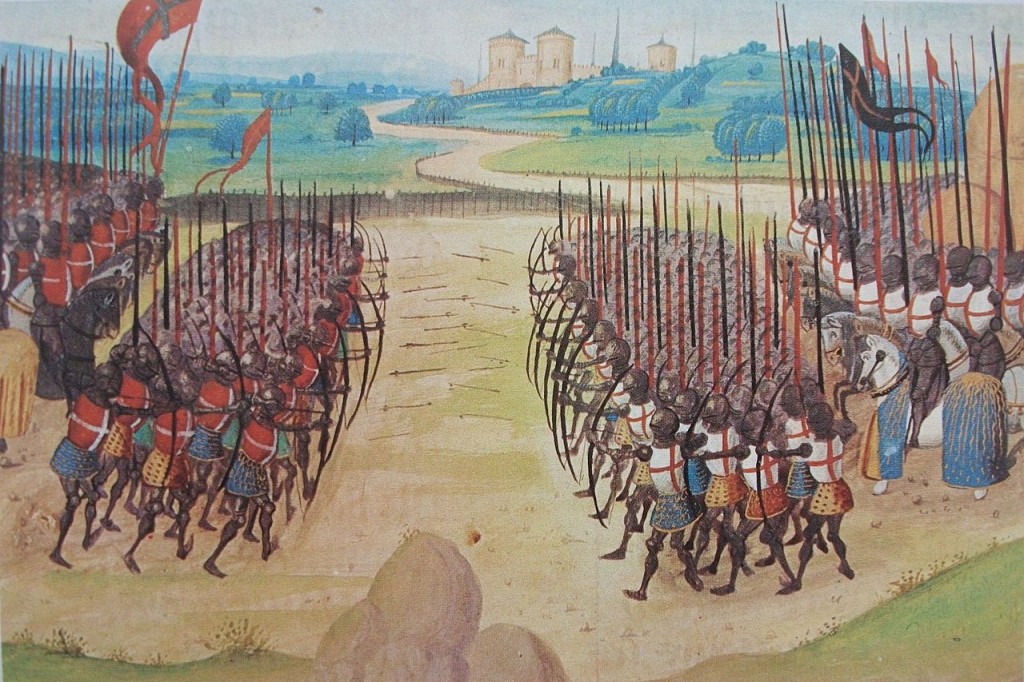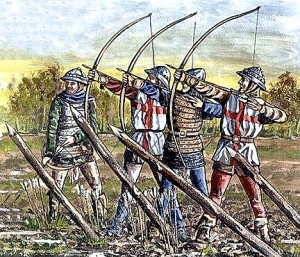In Shakespeare’s play Henry V, the King gives a rousing battle speech on the morning of the battle. This speech, the “St Crispin’s Day Speech, is often cited as one of Shakespeare’s greatest monologues. Several years ago, the web site DC Theatre Scene took a poll of their readers and some of DC’s “most fervent, and most expert, Shakespeareans” to determine the best monologue. All of the usual suspects made the list, but in the end, the general consensus was that “St Crispin’s Day” was the tops. That last page has a link to a podcast of local DC thespian James Konicek reading the speech, and there are plenty of movie excerpts available on YouTube. We present the monologue here, so that you can read aloud it for yourself—preferably in your most mellifluous RP accent.
WESTMORELAND. O that we now had here
But one ten thousand of those men in England
That do no work to-day!KING. What’s he that wishes so?
My cousin, Westmoreland? No, my fair cousin;
If we are mark’d to die, we are enow
To do our country loss; and if to live,
The fewer men, the greater share of honour.
God’s will! I pray thee, wish not one man more.
By Jove, I am not covetous for gold,
Nor care I who doth feed upon my cost;
It yearns me not if men my garments wear;
Such outward things dwell not in my desires.
But if it be a sin to covet honour,
I am the most offending soul alive.
No, faith, my coz, wish not a man from England.
God’s peace! I would not lose so great an honour
As one man more methinks would share from me
For the best hope I have. O, do not wish one more!
Rather proclaim it, Westmoreland, through my host,
That he which hath no stomach to this fight,
Let him depart; his passport shall be made,
And crowns for convoy put into his purse;
We would not die in that man’s company
That fears his fellowship to die with us.
This day is call’d the feast of Crispian.
He that outlives this day, and comes safe home,
Will stand a tip-toe when this day is nam’d,
And rouse him at the name of Crispian.
He that shall live this day, and see old age,
Will yearly on the vigil feast his neighbours,
And say “To-morrow is Saint Crispian.”
Then will he strip his sleeve and show his scars,
And say “These wounds I had on Crispin’s day.”
Old men forget; yet all shall be forgot,
But he’ll remember, with advantages,
What feats he did that day. Then shall our names,
Familiar in his mouth as household words-
Harry the King, Bedford and Exeter,
Warwick and Talbot, Salisbury and Gloucester-
Be in their flowing cups freshly rememb’red.
This story shall the good man teach his son;
And Crispin Crispian shall ne’er go by,
From this day to the ending of the world,
But we in it shall be remembered-
We few, we happy few, we band of brothers;
For he to-day that sheds his blood with me
Shall be my brother; be he ne’er so vile,
This day shall gentle his condition;
And gentlemen in England now-a-bed
Shall think themselves accurs’d they were not here,
And hold their manhoods cheap whiles any speaks
That fought with us upon Saint Crispin’s day.—Henry V, Act IV Scene iii 18–67

“The Battle of Agincourt”, illustration from Chroniques d’Enguerrand de Monstrelet (early 15th century). From Wikimedia



